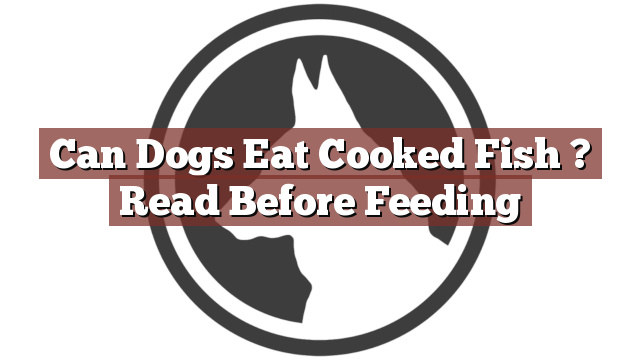Understanding Your Dog’s Dietary Needs
As a responsible pet owner, it is crucial to understand your dog’s dietary needs to ensure their overall health and well-being. While dogs are omnivorous and can consume a variety of foods, not all human foods are safe for them. Dogs require a balanced diet that includes proteins, carbohydrates, fats, vitamins, and minerals. However, their digestive system and metabolism differ from humans, making certain foods potentially harmful to them. Therefore, it is essential to be cautious when deciding what to feed your furry friend.
Can Dogs Eat Cooked Fish? Read Before Feeding
One common question that arises among dog owners is, "Can dogs eat cooked fish?" The answer is yes, dogs can eat cooked fish. In fact, fish is a popular ingredient in many commercial dog foods due to its high protein content and omega-3 fatty acids, which are beneficial for your dog’s skin, coat, and overall health. However, there are a few considerations to keep in mind before feeding cooked fish to your canine companion.
Pros and Cons of Feeding Cooked Fish to Dogs
Feeding cooked fish to your dog has its advantages and disadvantages. On the positive side, fish is an excellent source of lean protein, which helps in muscle development and repair. It also contains essential omega-3 fatty acids, such as EPA and DHA, which can reduce inflammation, support brain health, and improve the immune system. Additionally, fish is low in saturated fats and calories, making it a healthier alternative to other meat options.
However, feeding cooked fish to your dog also has some drawbacks. Fish bones can pose a choking hazard or cause internal injury to your pet. Therefore, it is crucial to ensure that the fish is boneless before feeding it to your dog. Moreover, some types of fish may contain higher levels of mercury or other toxins, which can be harmful to your dog’s health. It is advisable to consult your veterinarian to determine the safest fish options for your pet.
Conclusion: Considerations for Feeding Cooked Fish to Your Dog
In conclusion, cooked fish can be a healthy addition to your dog’s diet, considering it is boneless and does not contain any harmful toxins. The omega-3 fatty acids present in fish offer numerous benefits for your dog’s overall health. However, it is essential to take certain precautions before feeding fish to your dog. Always ensure that the fish is thoroughly cooked, boneless, and free from any seasonings or additives that may be harmful to your pet. Additionally, consult your veterinarian to determine the best fish options and appropriate portion sizes for your dog’s specific dietary needs. By following these guidelines, you can safely incorporate cooked fish into your dog’s diet and provide them with a nutritious and delicious treat.
Thank you for taking the time to read through our exploration of [page_title]. As every dog lover knows, our furry friends have unique dietary needs and responses, often varying from one canine to another. This is why it's paramount to approach any changes in their diet with caution and knowledge.
Before introducing any new treats or making alterations to your dog's diet based on our insights, it's crucial to consult with a veterinarian about [page_title]. Their expertise ensures that the choices you make are well-suited to your particular pet's health and well-being.
Even seemingly harmless foods can sometimes lead to allergic reactions or digestive issues, which is why monitoring your dog after introducing any new food item is essential.
The content provided here on [page_title] is crafted with care, thorough research, and a genuine love for dogs. Nevertheless, it serves as a general guideline and should not be considered a substitute for professional veterinary advice.
Always prioritize the expert insights of your veterinarian, and remember that the health and happiness of your furry companion come first.
May your journey with your pet continue to be filled with joy, love, and safe culinary adventures. Happy reading, and even happier snacking for your canine friend!

